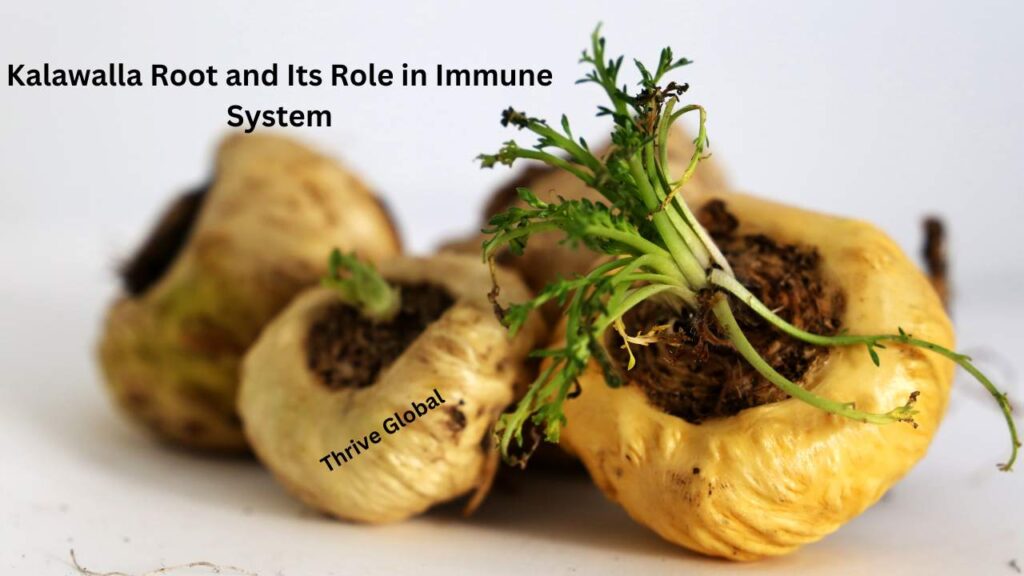In an era where the search for natural health remedies is on the rise, Kalawalla root stands out for its potential benefits, particularly its role in supporting the immune system. Known scientifically as Polypodium leucotomos, Kalawalla has been used for centuries in traditional medicine. Know the history, benefits, and scientific evidence behind Kalawalla root, highlighting its significance in promoting immune health.
Understanding the Immune System
The immune system is a complex network of cells, tissues, and organs that work together to defend the body against harmful pathogens. It is our body’s primary defense mechanism, constantly working to identify and neutralize invaders like bacteria, viruses, and other foreign substances. Maintaining a robust immune system is crucial for overall health and well-being, making it essential to support it through proper nutrition, lifestyle choices, and, potentially, natural supplements like Kalawalla root.
The History of Kalawalla Root
Traditional Uses in Medicine
Kala walla root has a rich history of use among indigenous populations in Central and South America. Traditionally, it has been utilized for its medicinal properties, particularly in treating various skin conditions and inflammatory diseases. The root was often prepared as a decoction or extract and consumed to alleviate symptoms of ailments ranging from psoriasis to rheumatoid arthritis.
Kalawalla Root: An Overview
Botanical Profile of Kalawalla
Kalawalla, scientifically known as Polypodium leucotomos, is a tropical fern native to Central and South America. It thrives in humid, forested environments and is known for its creeping rhizomes and distinctive fronds. The medicinal properties of Kalawalla are primarily derived from its roots, which contain a variety of bioactive compounds.
Active Compounds in Kalawalla Root
Polypodium Leucotomos Extract
The active compounds in Kala walla root, collectively referred to as Polypodium leucotomos extract, include a range of polyphenols, alkaloids, and polysaccharides. These compounds are known for their potent anti-inflammatory, antioxidant, and immunomodulatory properties, making Kalawalla a promising natural remedy for enhancing immune function.
Also Read: TOCS: A Key to Early Detection and Management of Childhood Stuttering
The Role of Kalawalla in the Immune System
How It Supports Immune Function
Kalawalla root supports the immune system in several ways. Its bioactive compounds help modulate immune responses, ensuring that the body’s defense mechanisms operate efficiently without overreacting. This balance is particularly beneficial for individuals with autoimmune disorders, where the immune system mistakenly attacks the body’s own tissues.
Anti-inflammatory Properties
Reducing Chronic Inflammation
One of the key benefits of Kalawalla root is its anti-inflammatory properties. Chronic inflammation is a major contributing factor to many diseases, including autoimmune conditions and chronic infections. Kala walla root helps reduce inflammation by inhibiting the production of pro-inflammatory cytokines and other inflammatory mediators, thus promoting overall immune health.
Antioxidant Effects of Kalawalla Root
Fighting Free Radicals
Kalawalla root is rich in antioxidants, which play a crucial role in protecting the body from oxidative stress. Free radicals, unstable molecules that can damage cells and tissues, are a natural byproduct of metabolism but can become harmful in excess. Antioxidants in Kala walla root neutralize free radicals, reducing oxidative stress and supporting immune function.
Clinical Studies on Kalawalla Root
Evidence-Based Benefits
Several clinical studies have investigated the benefits of Kalawalla root, particularly its impact on immune health and inflammation. Research has shown that Polypodium leucotomos extract can enhance the body’s immune response, reduce inflammation, and protect against UV-induced skin damage. These findings support the traditional use of Kala walla root and highlight its potential as a natural immune booster.
Autoimmune Disorders and Kalawalla Root
Managing Autoimmune Conditions
Kalawalla root has shown promise in managing autoimmune disorders, such as multiple sclerosis, lupus, and rheumatoid arthritis. By modulating the immune system and reducing inflammation, Kalawalla can help alleviate symptoms and improve quality of life for individuals with these conditions. It offers a natural alternative to conventional treatments, which often come with significant side effects.
Kalawalla Root for Skin Health
Treatment for Skin Disorders
Kalawalla root has been traditionally used to treat various skin conditions, including psoriasis, eczema, and vitiligo. Its anti-inflammatory and antioxidant properties help reduce skin inflammation and oxidative damage, promoting healthier skin. Clinical studies have shown that Kalawalla root can reduce the severity of skin lesions and improve overall skin health.
Kalawalla Root and Brain Health
Neuroprotective Benefits
Emerging research suggests that Kalawalla root may also benefit brain health. Its antioxidant and anti-inflammatory properties can protect brain cells from oxidative damage and inflammation, which are common factors in neurodegenerative diseases like Alzheimer’s and Parkinson’s. While more research is needed, these findings indicate that Kala walla root could be a valuable supplement for maintaining cognitive function and brain health.
Supporting Joint Health
Relief from Arthritis
Kalawalla root’s anti-inflammatory properties extend to joint health, making it a potential remedy for arthritis and other joint-related conditions. By reducing inflammation and pain in the joints, Kalawalla can improve mobility and quality of life for individuals with arthritis. It offers a natural alternative to nonsteroidal anti-inflammatory drugs (NSAIDs), which can have adverse side effects with long-term use.
Kalawalla Root in Cancer Research
Potential Anti-cancer Properties
Recent studies have explored the potential anti-cancer properties of Kalawalla root. Its bioactive compounds have shown the ability to inhibit the growth of cancer cells and induce apoptosis (programmed cell death). While these findings are preliminary, they suggest that Kala walla root could be a valuable adjunct therapy in cancer treatment. Further research is needed to fully understand its mechanisms and efficacy in this context.
Dosage and Administration
Recommended Intake
The appropriate dosage of Kala walla root depends on various factors, including age, health status, and specific health goals. Generally, a daily dose of 300-600 mg of Polypodium leucotomos extract is recommended for immune support and inflammation reduction. It is important to follow the dosage instructions on the supplement label and consult a healthcare provider before starting any new supplement regimen.
Potential Side Effects and Precautions
Safety Considerations
Kalawalla root is generally considered safe for most people when taken at recommended dosages. However, some individuals may experience side effects such as gastrointestinal upset or allergic reactions. Pregnant and breastfeeding women should avoid using Kalawalla root due to the lack of safety data in these populations. As with any supplement, it is important to consult a healthcare provider before use, especially if you have underlying health conditions or are taking other medications.
Integrating Kalawalla Root into Your Routine
Tips for Daily Use
Incorporating Kalawalla root into your daily routine is simple. It can be taken as a capsule, tablet, or liquid extract, depending on your preference. For optimal results, take Kala walla root consistently and pair it with a healthy diet and lifestyle. Combining Kalawalla with other immune-boosting practices, such as regular exercise, adequate sleep, and stress management, can enhance its benefits.
Comparing Kalawalla with Other Immune Boosters
Benefits Over Other Herbs
While there are many natural remedies available for immune support, Kala walla root stands out for its unique combination of anti-inflammatory, antioxidant, and immunomodulatory properties. Compared to other herbs like echinacea or elderberry, Kalawalla offers a broader range of benefits, particularly for individuals with autoimmune conditions or chronic inflammation.
Kalawalla Root in Modern Supplements
Available Products and Their Efficacy
Today, Kalawalla root is available in various supplement forms, including capsules, tablets, and liquid extracts. Many supplements combine Kalawalla with other immune-supporting ingredients to enhance its efficacy. When choosing a Kalawalla supplement, look for products that are standardized to contain a specific amount of Polypodium leucotomos extract, ensuring consistent quality and potency.
Personal Experiences and Testimonials
Real-life Success Stories
Many individuals have reported positive experiences with Kala walla root, particularly in managing autoimmune conditions and skin disorders. Testimonials highlight improvements in symptoms, such as reduced inflammation, better skin health, and enhanced overall well-being. These real-life stories underscore the potential benefits of Kalawalla root as a natural remedy.
Buying Guide for Kalawalla Root
Where to Purchase High-Quality Products
When buying Kalawalla root supplements, it is important to choose high-quality products from reputable brands. Look for supplements that are third-party tested for purity and potency, and check customer reviews to ensure product satisfaction. Purchasing from trusted health food stores or online retailers with a solid reputation can help you find reliable Kalawalla root supplements.
Environmental Impact of Kalawalla Harvesting
Sustainable Practices
Sustainable harvesting practices are essential to ensure the long-term availability of Kala walla root. Responsible companies engage in ethical sourcing, avoiding overharvesting and supporting reforestation efforts. By choosing products from brands committed to sustainability, you can help protect the environment and support the continued use of Kala walla root in natural medicine.
Future Research Directions
Upcoming Studies and Potential Discoveries
The potential benefits of Kala walla root continue to attract scientific interest. Future research aims to further elucidate its mechanisms of action and explore new therapeutic applications. Upcoming studies may investigate its effects on other health conditions, optimize dosages, and develop new formulations to enhance its bioavailability and efficacy.
Also Read: Choosing the Right pH Test Strips: A Buyer’s Guide
FAQs
What is Kalawalla root?
Kala walla root, derived from the fern Polypodium leucotomos, is a natural remedy known for its immune-boosting, anti-inflammatory, and antioxidant properties.
How does Kala walla root support the immune system?
Kalawalla root supports the immune system by modulating immune responses, reducing chronic inflammation, and protecting against oxidative stress.
Can Kalawalla root help with autoimmune disorders?
Yes, Kala walla root has shown promise in managing autoimmune disorders by balancing immune responses and reducing inflammation.
Are there any side effects of Kalawalla root?
Kala walla root is generally safe for most people, but some may experience gastrointestinal upset or allergic reactions. Consult a healthcare provider before use.
How should Kalawalla root be taken?
Kalawalla root can be taken as a capsule, tablet, or liquid extract. Follow the dosage instructions on the supplement label and consult a healthcare provider for personalized advice.
Where can I buy high-quality Kala walla root supplements?
High-quality Kala walla root supplements can be purchased from reputable health food stores, online retailers, and brands that prioritize ethical sourcing and third-party testing.
Conclusion
Kalawalla root offers a natural, multifaceted approach to supporting immune health. Its rich history, combined with modern scientific evidence, underscores its potential as a valuable supplement for reducing inflammation, fighting oxidative stress, and modulating immune responses. Whether managing autoimmune conditions or seeking overall immune support, Kala walla root presents a promising natural remedy. By incorporating it into your daily routine and choosing high-quality products, you can harness the benefits of this remarkable plant for better health and well-being.



